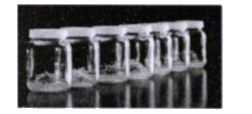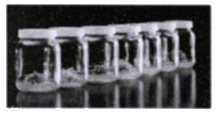Bacteria increases at the rate proportional to the number of bacteria present. If the original number N doubles in 3 hours, find in how many hours the number of bacteria will by 4N ?
The correct Answer is:6 hours
To solve the problem, we will use the concept of exponential growth, which is described by the differential equation:
dNdt=kN
where N is the number of bacteria, t is time, and k is the constant of proportionality.
Step 1: Set up the equation
The solution to the differential equation is given by:
N(t)=N0ekt
where N0 is the initial number of bacteria.
Step 2: Use the given information
We know that the original number N0 doubles in 3 hours. This means:
N(3)=2N0
Substituting into the equation, we have:
2N0=N0e3k
Step 3: Simplify the equation
Dividing both sides by N0 (assuming N0≠0) gives:
2=e3k
Step 4: Solve for k
Taking the natural logarithm of both sides:
ln(2)=3k
Thus, we can solve for k:
k=ln(2)3
Step 5: Find the time when N=4N0
We want to find the time t when the number of bacteria is 4N0:
4N0=N0ekt
Dividing both sides by N0:
4=ekt
Step 6: Substitute k
Substituting k=ln(2)3 into the equation:
4=e(ln(2)3)t
Step 7: Take the natural logarithm
Taking the natural logarithm of both sides:
ln(4)=ln(2)3t
Step 8: Solve for t
We know that ln(4)=ln(22)=2ln(2). Thus, we have:
2ln(2)=ln(2)3t
Dividing both sides by ln(2) (assuming ln(2)≠0) gives:
2=t3
Multiplying both sides by 3:
t=6 hours
Final Answer
The number of bacteria will be 4N in 6 hours.
---
Topper's Solved these Questions
- DIFFERENTIAL EQUATIONS Book:NAVNEET PUBLICATION - MAHARASHTRA BOARDChapter:DIFFERENTIAL EQUATIONS Exercise:M.C.Q
Explore 12 Videos
- DIFFERENTIAL EQUATIONS Book:NAVNEET PUBLICATION - MAHARASHTRA BOARDChapter:DIFFERENTIAL EQUATIONS Exercise:Examples for practice (8)
Explore 7 Videos
- DEFINITE INTEGRALSBook:NAVNEET PUBLICATION - MAHARASHTRA BOARDChapter:DEFINITE INTEGRALSExercise:MULTIPLE CHOICE QUESTIONS
Explore 10 Videos
- DIFFERENTIATIONBook:NAVNEET PUBLICATION - MAHARASHTRA BOARDChapter:DIFFERENTIATIONExercise:MCQ
Explore 15 Videos
Similar Questions
In a certain culture of bacteria, the rate of increase is proportional to the number present. If it is found that the number doubles in 4 hours, find the number of times the bacteria are increased in 12 hours.
View SolutionBacteria multiply at a rate proportional to the number present. If the original number N double in 3 hours, the number of the bacteria will be 4N is (in hours).
View Solution
Knowledge Check
The population of a country increases at the rate proportional to the number of inhabitants. Given that the population of country doubles in 30 years, then in how many years population of country will triple, (given that In2 = 0.6931, ln3 = 1.0986)
A30 yearsB45 yearsC48 yearsD54 yearsThe rate of increase in the number of bacterai in a certain becteria culture is propotional to the number present at that time. If is found that the number doubles in 4 hours, then at the end of 12 hours, the number of bacteria are
A4 times the originalB6 time the originalC8 times the originalD10 times the originalRead the following text and answer the following questions on the basis of the same: The rate of increase in the number of bacteria in a certain bacteria culture is proportional to the number present. Given that the number triples in 5 hours.

If 'N' is the number of bacteria, the corresponding differential equation is ____________ .AdNdt=KtBdNdt=KNCdKdt=NDdKdN=t
The rate of increase of the bacteria in a culture is proportional to the number of bacteria present and it is found that the number doubles in 6 hours. Prove that the bacteria becomes 8 times at the end of 18 hours.
View SolutionIn a certain culture the number of bacteria at any instant increases at a rate proportional to the cube root of the number present at that instant. If the number becomes 8 times in 3 hours, when will the number be 64 times?
View SolutionThe rate of increase in the number of bacteria in a certain bacteria culture is proportional to the number present. Given the number triples in 5 hrs., find how many bacteria will be present after 10 hours. Also find the time necessary for the number of bacteria to be 10 times the number of initial present. [Given loge3=1.0986, e2.1972=9 ]
View SolutionThe rate of growth of bacteria is proportional to the number present . If initially, there were 1000 bacteria and the number doubles in 1 hours. Find the number of bacteria after 212 hours . [ take √2=1.414]
View SolutionRead the following text and answer the following questions on the basis of the same: The rate of increase in the number of bacteria in a certain bacteria culture is proportional to the number present. Given that the number triples in 5 hours.

If N0 is the initial count of bacteria, after 10 hours the count is __________ .
View Solution